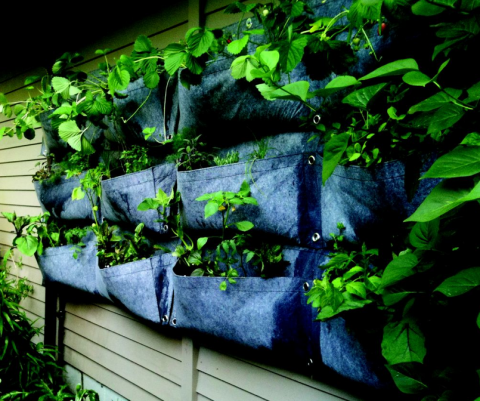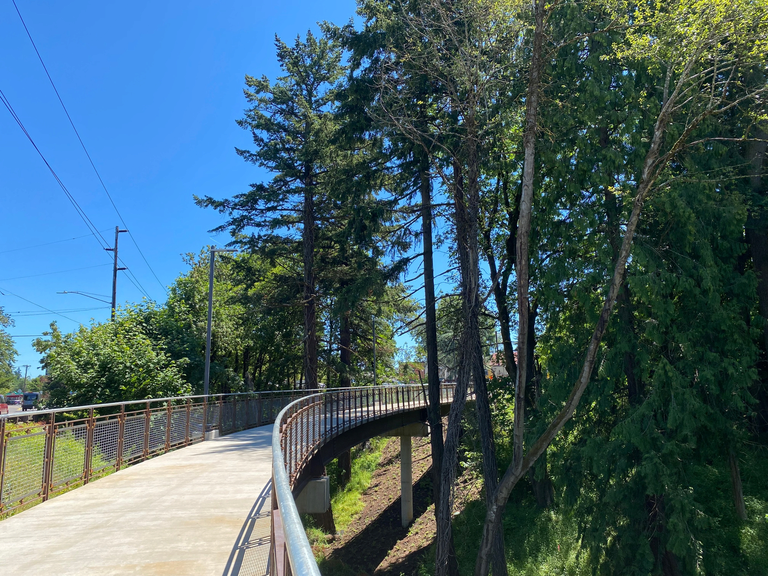
“We don’t live in Southern California,” points out landscape designer Lynn Wolfstone. Portland summers are beautiful, but let’s be realistic. “Chances are we are going to look at our garden more than we will be in our garden.” Lynn was born and raised in Portland, so she knows whereof she speaks. “I always ask a client, ‘Where will you be when you see your garden?’ Unless you love standing in the rain, it is often from a vantage point inside your house. In my case, I’m in my kitchen or my dining room, looking out. I want that view to be wonderful.”
In her own garden, Lynn found a creative way to cope with our Pacific Northwest climate and integrate our regional interest in recycling and sustainability. She has only one spot with southern exposure, so she transformed it into a beautiful “wall of plants.” She attached a product called Root Pouches – bags woven from recycled plastic bottles – to the wall. She then connected them with an irrigation tube system and planted a variety of herbs and other plants. They thrive there, eventually cascading down over the pouches to create a unique feature in her garden (RootPouches.com).
Gardening has always been part of Lynn’s life. Her parents were avid gardeners on their property, which included lawn, gardens, an orchard and woods. She was out there a lot, learning by doing. At the University of Oregon, she majored in art history and then went to work at the Augen Gallery, later for Laura Russo Gallery. It was fun and satisfying, but she still took the occasional gardening class in what had become her hobby. When her second child was born, Lynn did art consulting and a whole lot of volunteering but stopped full-time work to focus on her children, Mark and Annie. When the kids were older, she decided to return to her roots and get a degree in landscape design.
The technical side of the work is to create what she calls “effective and zone-appropriate designs.” Still, she believes her art background plays a part in all her landscape projects. “I think of a garden as a scene,” Lynn says. As a landscape specialist, she knows what will work, and as an artist she sees shapes and colors and how they can work together. But, she points out, it is not about what she would do if it were her yard.
“My greatest challenge is to help a new client figure out what they really want,” she says. “Of course I need to know what they will do in their yard, but I also want to know what they love.” They know they want an outdoor kitchen or a place for the kids to play. But what “scene” do they see in their heads? Maybe they remember a beautiful lawn on a trip to England, or they long for a rock garden like their mother had or an apple tree like the one they climbed at their grandfather’s. “It can take long conversations for someone to realize what kind of a garden would make them happy.” Lynn and her husband Jeff ’s garden makes them very happy. Lynn characterizes her style as “clean and contemporary, with Asian influences and regional plants.”
Lynn shared some tips to help others get the garden of their dreams:
1. The important first step: talk about what speaks to you when you look at or walk through a landscaped space.
2. Think about colors and scents. This is particularly true in the area leading to your front door. “Your yard is an extension of your home,” Lynn advises. “Your front porch welcomes you home and tells others what to expect when they get inside.”
3. Enjoy your yard during the dark hours, too. “Uplighting the trees you see from your dining room table can extend the hours you have to experience the beauty of the garden you created.”
4. How will you keep it up once it is finished? Not everybody loves yard work. “I don’t want it to be another job for you,” Lynn says, “unless that’s what you want. Your yard should be fun.” Choose landscape elements you can maintain.
5. Whether you will be doing the work yourself or hiring a professional, do some research. Lynn herself gets information and inspiration from other professionals all the time. Particularly useful is The Association of Professional Landscape designers, whose Oregon Chapter website (APLDOregon.org) has ideas and resources.





